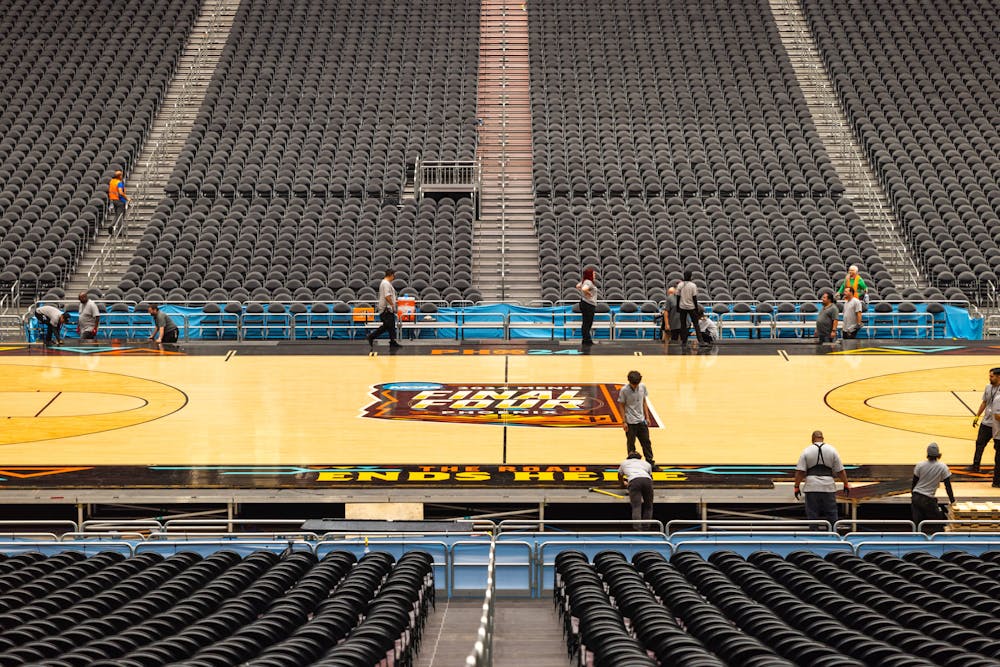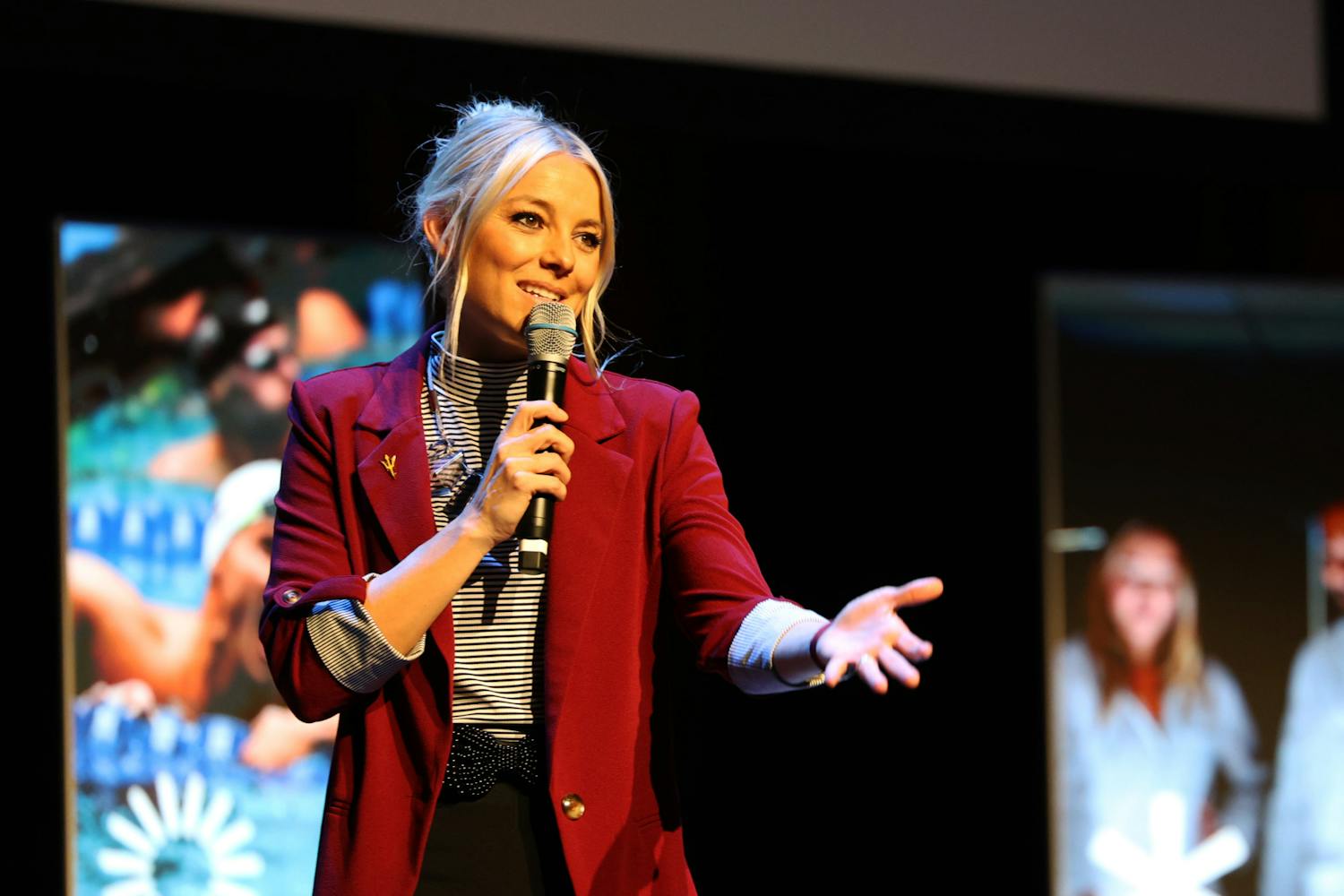History is made at the Final Four each year, but little is known about the Midwestern town that makes it all possible.
The 2024 Men’s Final Four court was recently installed at State Farm Stadium in Glendale, culminating in countless work hours for Connor Sports and the Michigan town the company calls home.
Connor Sports was founded in 1872 as a furniture company. Later, the business moved to its current home in Amasa, Michigan, and started making basketball courts shortly after the game was invented.
"The mill plays an extremely important piece of the entire Upper Peninsula and the surrounding areas of Amasa itself," Connor Sports Marketing Director Zach Riberdy said. "So we actually have a workforce that we pull from the surrounding villages of Crystal Falls, Iron Mountain and Amasa."
Amasa is tucked into a sleepy corner of the Midwestern state's Upper Peninsula. The town can be found in the middle of Michigan's endless forests, far away from the Great Lakes coastlines Michiganders pride themselves on.
Amasa is home to less than 200 people, but the tiny town's influence far exceeds its population.
"That isn't even enough to fill a section of State Farm Stadium this year in Arizona for the Final Four games," Riberdy said. "So just to know the impact that such a small town has on the basketball landscape because of our partnership with the NCAA, the products we have in the NBA and multiple Division One schools across the country, it's pretty awesome."
It took over a century for Connor Sports to blossom into the NCAA's premier court producer. The company installed its first college court in the 1990s and started its relationship with the NCAA in 2006. Today, the company is the go-to court manufacturer for March Madness, the Summer Olympic Games, 14 NCAA conference championships and 15 NBA teams.
A year's worth of work goes into each NCAA court made in the minuscule Michigan town. Connor Sports sources its timber in the dead of winter, air-drys the woods and uses a kiln to reach the correct internal humidity for each board. Then, the Amasa mill cuts the boards into 4-foot by 7-foot raw panels ready for final touches.
Workers at a separate court-finishing company meticulously sand, paint and cure each panel. This year, 381 court panels were shipped in trucks to QHF Sports in San Marcos, Texas, over 1,400 miles from Connor Sports' headquarters. Finally, they were driven another 1,000 miles to Glendale, and snapped together just eight days before tip-off, Riberdy said.
Riberdy said that installation in Arizona was more straightforward than in past years. Last time around, Houston hosted the Final Four at NRG Stadium. Connor Sports had to wait to install the court until after bulldozers could clear dirt used for the Houston Livestock Show and Rodeo, which wrapped up 11 days earlier.
"It was a pretty amazing process to see the entire arena cleared and cleaned before we (could) move the court," Riberdy said. "So once the court arrives on site, we usually get the court down. The fastest is an hour, but usually it's about two hours to complete."
Luckily, State Farm Stadium was ready and waiting for the court to arrive. The stadium had previously undergone a long process of installing temporary stands and a scoreboard over the court. Glendale city manager Kevin Phelps said his municipality needed six to seven weeks to prepare State Farm Stadium and get it up to code for building and fire safety inspectors.
READ MORE: Glendale won't break even from hosting Final Four
Connor Sports sent technicians to help local workers install each panel in March. Connor Sports CEO Benjamin Bachman applauded the company’s employees for their part in building each court.
"Each member of the Connor Sports team has played a pivotal role in ensuring that an optimum playing experience will be had by the student-athletes competing and the fans cheering on both the men’s and women’s tournaments," Bachman said in a press release.
The company's court is now ready to be the stage for tales of heroic players trying to lift a banner, all while telling the story of Arizona. The Final Four hardwood features an outline of Arizona on the center circle, marked by a saguaro, jagged mountains and a warm desert sun fittingly drawn as a basketball.
After a national champion is crowned, the court's ultimate fate depends on the victor's wishes. For one, UConn wanted to keep the panels making up the center logo last year. Other champions have purchased the entire court for use in a practice facility, while others have shown no interest in buying a single panel.
Arizona's rendition of the Final Four court is one of many Connor Sports has recently worked on. Making the court for a game on the biggest stage in college basketball is a point of pride for Connor Sports and the small town of Amasa.
"Just about everybody on our team has touched the floors that are going to the NCAA," Riberdy said. "So it's pretty special for me on my side to know that every employee, with the exception of us in the office, really has their hands involved with this."
Edited by Walker Smith, Sadie Buggle and Grace Copperthite.
Reach the reporter at jcbarron@asu.edu and follow @jackcbarron on X.
Like The State Press on Facebook and follow @statepress on X.
Jack is a senior studying sports journalism. This is his fourth semester with The State Press. He has also worked at Radio Sucesos and XPR Sport Experience in Argentina.




